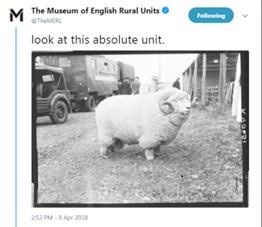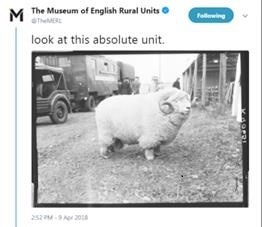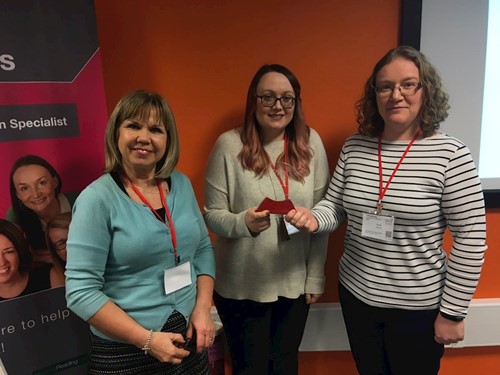Lancashire Teaching Hospitals won a bronze award for our Summer Reading Journey Campaign at CILIP’s Publicity and Public Relations Group Marketing Excellence Awards Conference. The conference was held at Aston University, Birmingham on the 25th January 2019 and the Healthcare Library Unit (HCLU) very kindly paid for us to pick up our award in person and go to the conference. The conference was a great opportunity to show off our campaign and pick up tips from other award winners and speakers.
Adam Koszary –(Programme Manager and Digital Lead for Museum of English Rural Life (MERL) and Reading Museum) gave a lively presentation about a tweet which went viral and how they responded to it to make the most out of the increased traffic to their Twitter account. He discussed their reaction, how they responded quickly and kept it very conversational and light. Also, how they used this experience to create and implement a social media strategy.


The tweet that went viral
Their Twitter account’s “tone” is basically down to Adam’s personality. He posts authentic posts rather than scripted ones. This has proved to be a great success but as a health service, the tone used at MERL would be unsuitable for us to use as it was a bit too cheeky! The other problem with social media accounts reliant on a personality is what happens when that person isn’t there? In the short term colleagues with similar personalities can take over but when a person leaves it can be more problematic. Following this we will look at the tone used in our posts. Although we won’t be risky with what we post, we will be a bit more conversational and will continue with “authentic” posts as much as possible.
Gemma Wood (Marketing Executive at CILIP) presented ‘Don’t Leave me this way’ on why users leave and how to retain them. She said that users leave for a variety of reasons –maybe they don’t see the value in what you are offering or maybe they’ve had a difficult user experience. She discussed looking for patterns in user behaviour, reminding them of the value in what you are offering and said that sometimes no matter what you do you can’t always stop people leaving. She encouraged people to look at direct marketing and personalising marketing to different groups. GDPR always needs to be considered because if people have opted out of marketing then this becomes tricky. However, if they have signed up to marketing emails then they can be directly targeted. It’s a really complex issue and she didn’t have a definite fix for how to solve it, other than to try lots of different tactics.
An interesting question and answer session about library marketing followed with a student panel - Key points to take away:
• Students use Instagram! Facebook is old fashioned but emails and Twitter are still acceptable - Not great for health libraries as no real need to use Instagram, however, we could use live features during induction weeks/open days.
• Emails –not too many, be specific, group by year or department.
• Inductions are important – make the most out of getting involved in them!
• Engage other students to help spread your campaigns or messages –use a course representative or someone who can talk to students on your behalf.
• Use a feedback/suggestion board to capture user feedback –also don’t forget to tell them what you have done –write up and communicate what has changed.
• Incentives are always a win!
The afternoon saw award presentations to us, Plymouth Libraries, University of Birmingham and the Royal National Institute of Blind People (RNIB)
Plymouth Libraries –Lunch at the Library
This was a summer campaign aimed at offering disadvantaged children a free meal in the library when attending library events. This helped engage users who may have not used the library service before and was a great way of promoting all the events that the library ran. This event was very successful and is now continuing each year. The wider benefits for the library were an increase in visitors and attendance and users completing the Summer Reading Challenge. It also enabled staff to train in visitor engagement and presentation skills. The presentation was really useful in terms of explaining the importance of links and networking as through doing this Plymouth Libraries were able to secure funding for the lunches. The network they have created means they can continue to do this for the foreseeable future and it demonstrates the effect a successful network can have on resources/usage.
Lancashire Teaching Hospitals –Summer Reading Journey (Have a look at Issue 57 of LIHNNK Up for more details on our award-winning campaign!)

Sinead and Sarah receiving their award
University of Birmingham –A Hidden Gem promoting the overlooked site library
discussed a range of marketing techniques and incentives to promote available study spaces in a different library located away from the main campus. This included improved signage, a free regular shuttle service to the site including staff meeting students from the shuttle to direct them to the library! They used free coffee vouchers to use at the library and engagement through social media linking in with the university campaign to ‘Be Exam Ready’ and emails through college departments. This was really useful for us as it made us reflect on the fact that we have two library sites, with one used more than the other and this presentation gave us some ideas to try.
RNIB –World Book Day at RNIB
RNIB wanted to make World Book Day titles available for their users through braille, audio or large print so that each child had a book of their own. They communicated this message via social media to people who might not have been aware of the service. They tagged authors and publishers of World Book Day titles to increase knowledge of the service. This presentation made us reflect on our service and the importance of making sure it is accessible for all.
What we learned
• Social media is vital for engagement, but it has to be relevant for the target audience
• Remember to make your marketing accessible for everyone
• Consistent branding is key… on flyers, posters, website, social media
• You don’t have to have a lot of money, but you have to believe in what you are marketing
• If in doubt give out cake or chocolate!
What we are going to do as a result of attending
• We already knew the value of the feedback board in our library –this has been running for a few months now and has really been successful –if you haven’t got one already then it is a quick and easy thing to do. We type the feedback up every month and display it in the library, then wipe the board clean to start again. It’s important to communicate your answers back to your users so they know you are listening. Following on from what was said on the day we will definitely continue to do this.
• The importance of tone on social media is paramount; the need for a human response; have personality in your posts; be authentic and relevant - don’t just post pictures of books!
• Consistency over social media platforms – we have multiple staff who access our social media accounts, we are going to look at this to ensure everyone works in the same way to encourage the same “tone” is being used.
• Not all staff knew how to tag authors in relevant posts but we will make sure everyone knows how to do it.
• Ensure we use ALT text on social media so that images, GIFs etc can be read aloud; the important thing to remember is to capitalise the first letter of each word in hashtags so it reads the hashtag as individual words so it makes sense to users who need to have text read aloud e.g. #WorldBookDay.
• We will continue to update our marketing materials to be consistent with each other.
• Sharing ideas with other libraries is vital so that we are continually developing our service to make it better for our users.
Conclusions
Though the conference was about marketing in general, a major theme of the day was the use of social media. Instagram is seen as vital in universities and Facebook is seen as obsolete by younger people. It was interesting to see how social media can be beneficial for marketing, not just to promote an event but to encourage new users and spread a message such as the RNIB’s audiobook/braille translation of World Book day titles. The RNIB talk was enlightening on how to make media more inclusive, for example by including alternative text descriptions of images. Plymouth libraries’ campaign “Lunch at the library” also had an inclusive theme with its aim to get families using the libraries during the school holidays when “holiday hunger” is experienced by those who rely on free school meals. The conference was attended by many academic libraries, public libraries and a few health libraries but the shared experiences were valuable and we would certainly recommend attending the conference if you get the opportunity.
Louisa Halton (Senior Library Assistant)
Deirdre Garner (Library Assistant)
Sinead English (Library Assistant)
Sarah Woodhall (Operational Librarian)
Library and Information Service
Lancashire Teaching Hospital NHS Foundation Trust

